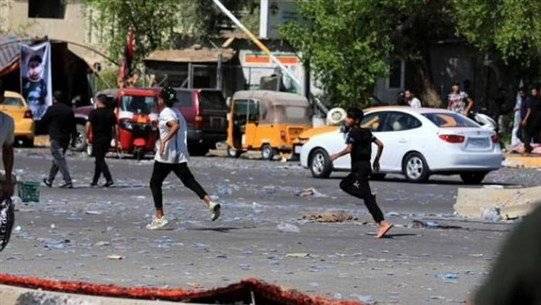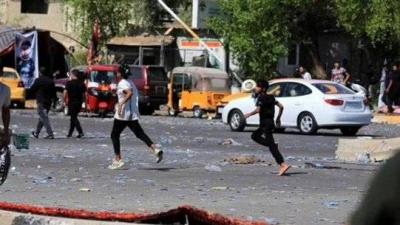This was said by former Lebanese President Camille Chamoun in 1976 when asked about the situation in Lebanon: "Watch Iraq and wait." The connection between developments in Iraq and their implications for Lebanon is not new. The circumstances between the two countries have often been similar, as have the influential external powers. As long as the Iraqi tamarind does not ripen, it indicates a delay in resolving issues in the region. The request from the leader of the Sadrist movement, Muqtada al-Sadr, to withdraw his supporters from the streets suggests that the security situation in Iraq will remain under control, especially after al-Sadr's announcement of his withdrawal from political life.
The situation in Iraq is still unclear despite the resolution of the Shiite issue following al-Sadr's exclusion from the Iraqi scene, as he was a cause for the Shiite dissent against agreement and unity, impeding the formation of a national unity government. Regionally, Iraq has sensitivity for Iran, which will not tolerate unrest at its borders, especially amid reports of parties seeking to exploit the Shiite conflict, something Iran has tried to contain. The decision was made, and al-Sadr was compelled to withdraw his forces to halt the problems and bloodshed, potentially moving towards political reconciliation.
Al-Sadr’s departure from Iraqi politics is linked to al-Haeri, a companion and student of Muqtada al-Sadr's father, who has been referenced as a guide. He issued a statement saying that he has withdrawn his religious authority and called upon all of his supporters to turn towards Khamenei's authority, declaring that any Iraqi party contributing to Shiite bloodshed has no ties to al-Sadr, even if they are his closest associates, leading al-Sadr to step down completely from political work.
Iraqi sources evaluate that the performance Muqtada al-Sadr provided was not correct; he had previously stepped back from politics several times before announcing the formation and subsequent dissolution of the Mahdi Army, seeking to dominate Shiite shares in the government despite electoral results not granting him such authority. The elimination of al-Sadr was a fundamental condition and an indicator of the party that won the battle in Iraq, which has its implications for the broader region. However, it is too early to predict the trajectory of forthcoming developments and whether the situations relate to the nuclear agreement and its nearing signature. Did those negatively affected by the agreement cause these events? Or did the U.S. want to confirm that the agreement is separate from events in the region? And is the goal to pressure Iraq to loosen conditions or to indicate that reaching an agreement would not lead to calm?
As for Lebanon, there are no supporters of al-Sadr, and the stance of the Shiite duo has been clear from the start, supporting Iraq's unity and calling for calm while opposing Muqtada al-Sadr’s position, especially regarding the Amal Movement and the sensitivity of supporting Sistani's stance against al-Sadr with whom he recently clashed. Lebanon has an interest in restoring calm to Iraq; it benefits significantly from the incoming Iraqi tourists and fuel assistance. Politically, Iraq's importance to the resistance axis parallels that of Syria, and perhaps it is even more critical at a strategic level.
Regarding Iraq and the nearing signature of the nuclear agreement, opinions vary between those who expect immediate reflections on regional issues, including Lebanon's government, presidency, and borders, and others who argue that the scale of crises in the region is substantial and intricately complicated, hence high-level repercussions from the agreement should not be expected. It may create a positive impression but will not resolve the accumulated crises from Syria to Yemen. However, any calm in the region will inevitably influence the crises.
In Lebanon, there are multiple complicated issues, and we have entered September, marking the last month for dollars to enter the country, while deadlines concerning border demarcation are approaching their end, with equal chances of war and agreement, while the American mediator Amos Hochstein has yet to bring a response. The aim was to separate Iraq from other regional issues like Syria and Lebanon, but attempts failed, and efforts to extricate the Iraqi card from Iran and delay the nuclear agreement and border negotiations were unsuccessful. Proponents of this view believe that any agreement in Iraq will inevitably reflect on Lebanon, and the route from the Mediterranean to Iran will reopen regarding politics and economy, making it improbable to elect a president outside of this line.
Nonetheless, the push towards forming a government indicates that the presidential vacuum will prevail, and no presidential elections are on the horizon. Therefore, there is a need to propel the current government forward by infusing it with some new ministers, which is currently being worked on while the shares remain the same. Will the efforts of the active players succeed in achieving this goal, and who did the Hezbollah deputy refer to when he said that there is no place for indulgence now? Certainly, the intended target was not their ally, the president, so who is it, and what is the practical implication from the party for such words?




